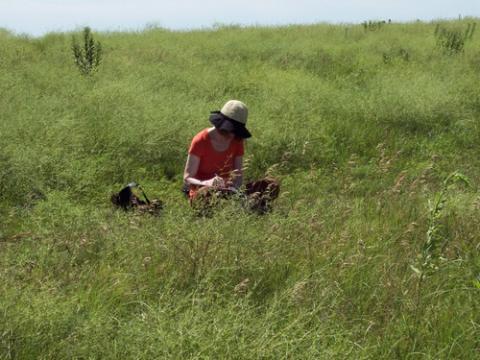
Reflections from the Prairie Writers' Workshop by Timothy Schaffert
Willa Cather taught in a writers' workshop in 1922, at Middlebury College, while working on her novel A Lost Lady. Upon the completion of her five-session course, her students saluted her with a witless poem: "Oh Miss Cather, when we gather/ For your talks so wise and clear/ Now you're going we're all hoping/ You'll come back another year." Perhaps because of the poem, Cather did not come back another year. As a matter of fact, she never again taught a creative writing workshop and stood lifelong in moral opposition to the whole endeavor.
Though my students in the Prairie Writers' Workshop didn't compose a poem for me (maybe it's difficult to find a poetical rhyme for "Mr. Schaffert"), they did write a great deal of compelling narrative and a number of lively character sketches, and I left inspired and anxious to return to Red Cloud.
The theme of the week-long course, "Fiction and Art," involved a look at Midwestern narratives inspired by visual art and artifact, including Cather's own short fiction; we also looked at her essay "The Novel Démeublé," in which she argues that fiction can become overburdened with material objects that fail to serve the story. "It is the inexplicable presence of the thing not named," she writes, encouraging authors to toss out the furniture, "of the over-tone divined by the ear but not heard by it, the verbal mood, the emotional aura of the fact or the thing or the deed, that gives high quality to the novel or the drama, as well as to poetry itself."
This sense that an object should haunt and resonate if it is to be mentioned at all is somewhat echoed by another author whose work we explored. Wright Morris, a renowned novelist and photographer, raised in Central City, Nebraska, published "photo-texts": fiction incorporating photography (as in the case of his novel The Home Place) and photography incorporating fiction (in ). "In all my life," he writes in a piece that accompanies the stark photo of an abandoned country structure, "I've never been in anything so crowded, so full of something, as the rooms of a vacant house. Sometimes I think only vacant houses are occupied."
Perhaps contrarily, we discussed the Weldon Kees piece, "The Public Library," a story composed entirely of snippets of things overheard and notes found, all suggestive of Kees' own experience as a librarian working within the precious hurly-burly of a community space. And his short story "I Should Worry" featured any number of visual details stuffed into its opening paragraphs-when we meet Arch Boyle, the main character, he has not only a half-smoked cigarette in one corner of his mouth, but also a broken toothpick in the other. Nonetheless, none of Kees' details seem excessive in that first page, particularly not the visual of Arch Boyle's sister "combing her hair with one hand, her eyes wandering from her distorted image to the pictures of movie actors that she had torn from magazines and pasted on the wall." That hair-combing, those movie-star photos, all take on different aspects, different color, when we're told she's upstairs in the room "in which his parents had killed themselves."
On Friday, the writers in the workshop gave a public reading, and the many images and emotions evoked in the gallery of the Opera House those evenings have stayed with me beyond Red Cloud: a crowded bathtub in a blue house; a jack-o-lantern in Japan; the cloudy spills of powder in a kitchen; a row of fish spastic in the water as they take all the bait at once; sisters in their father's recycled overalls; a car battery on an old sofa; a cassette recorder held together with blue tape; and a rodeo cowboy demonstrating all the dangers in holding a rope wrong.
Timothy Schaffert, who led this year's Prairie Writers' Workshop, grew up on a farm in Nebraska and currently lives in Omaha. His short fiction has been published in several literary journals and he has won numerous awards, including the Mary Roberts Rinehart Award and the Nebraska Book Award. He is the author of three critically acclaimed novels, Devils in the Sugar Shop, The Singing and Dancing Daughters of God, and The Phantom Limbs of the Rollow Sisters.
